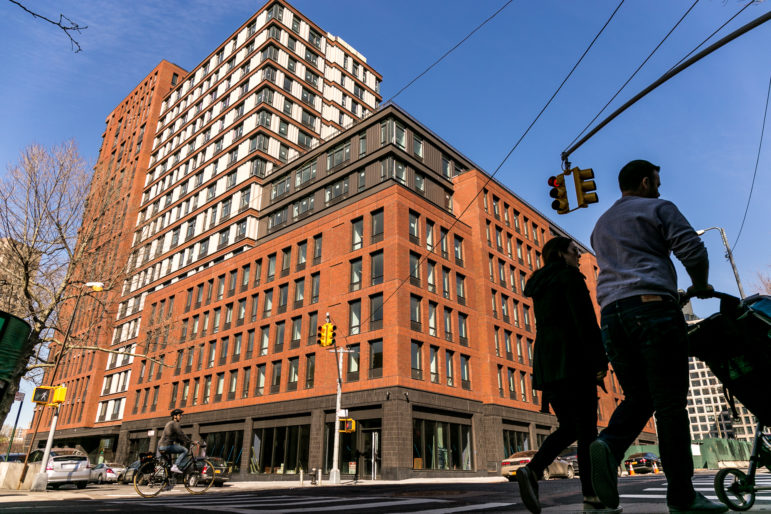‘If NYC’s leadership can commit to ending traffic deaths—not just to the tools they’ll use to achieve it but to the actual goal—then they should be able to do the same on the housing issues that shape our lives,’ housing advocates ANHD said in their analysis of the candidates’ written policies.

Adi Talwar
An affordable building in Brooklyn.None of the leading Democratic candidates running for mayor in the June 22 primary has made a specific commitment to reducing rent burdens or ending homelessness in New York City, according to an analysis of the top candidates’ written platforms by the Association for Neighborhood and Housing Development (ANHD).
While the candidates have proposed a bevvy of policy changes aimed at addressing the housing crisis, advocates are pushing the City Hall hopefuls to set the explicit goals of decreasing homelessness and increasing affordability, similar to how the city’s Vision Zero program is built around the goal of eliminating traffic deaths.
“To be clear, every candidate’s platform includes commitments to funding subsidy programs, building units, and implementing policies like fair housing enforcement and homeownership assistance, and these all matter a great deal,” the analysis, released by the coalition of nonprofit housing organizations, said.
Read More: How’d They Do? City Limits Grades the Candidates’ Second Debate Performance
“But if anything has been made apparent over the past several administrations, it’s that details matter — units built, neighborhoods rezoned, money invested, and legislation passed don’t necessarily translate into decreased homelessness and increased affordability if these have not been explicitly set as the metrics by which we can hold our city government accountable,” ANHD added. “If NYC’s leadership can commit to ending traffic deaths — not just to the tools they’ll use to achieve it but to the actual goal — then they should be able to do the same on the housing issues that shape our lives.”
The analysis looked at how each candidates’ written housing platform as of May 28 compares with the others’ on specific issues: Who’s pledged to shift funding from temporary shelters to permanent housing, how much city money each would commit to NYCHA and whether the candidates support putting all the city’s housing agencies under the control of a single deputy mayor (just Shaun Donovan, Kathyrn Garcia and Andrew Yang would do so, according to ANHD).
Seven of the top eight candidates in the race — Eric Adams, Donovan, Garcia, Dianne Morales, Scott Stringer, Maya Wiley and Yang — had published written plans that propose the expansion of tenants’ rights initiatives like Right to Counsel in housing court, or that promise enhanced enforcement of tenant protections. (Ray McGuire has not specified similar plans, according to ANHD.)
Stringer, Donovan and McGuire’s platforms were the only ones that explicitly called to expand down payment assistance services for homeowners, while just Adams, Morales and Stringer have proposed reforming the city’s controversial tax lien sales.
Even still, these plans are more focused on inputs than on outcomes—making it all the more vital that candidates commit not just to meeting metrics for new affordable units but to explicitly ending homelessness, advocates said.
“One of our big lessons from the de Blasio administration — and even from looking at the Bloomberg administration before that — is it’s shockingly possible for mayors to meet their stated housing goals, and by any sort of metric I can think of for the housing issue be worse,” said Emily Goldstein, director of organizing and advocacy at ANHD.
“de Blasio met his goal, and yet homelessness is worse than ever,” she added. “To me that’s an indicator that there was something wrong with the goal, right? He built the number of units and preserved the number of units that he said he was gonna do. But that didn’t actually result in solutions or even much progress on the affordability issue.”










2 thoughts on “How the NYC Mayoral Candidates’ Housing Platforms Stack Up”
I just wish the Candidates would recognise that MIH has not been effective; that it actually ends up gentrifying neighborhoods. The data proves that. In the proposed SoHo/NoHo upzoning, which is designed to encourage corporate rather than residential units, the buildings most at risk for being torn down and replaced for MIH (or Corporate towers) are those that are rent stabilized and located in SoHo’s part of Chinatown. And of course, if only 25% of the new residents earn under $100k, and currently 47% of the area residients earns earns under $100K, it will be even more inequitable than now. Data is from the 2014-18 American Community Survey for the 7 census tracts which overlap the rezoning area.
Here is how the Henry George School of Social Science stacks the candidates.
https://gcc02.safelinks.protection.outlook.com/?url=https%3A%2F%2Fwww.hgsss.org%2Fare-the-2021-nyc-mayoral-candidates-in-sync-with-henry-george%2F&data=04%7C01%7Cmartin.rowland%40parks.nyc.gov%7C6e99a6993d4f4850452008d92c4cc4f0%7C32f56fc75f814e22a95b15da66513bef%7C0%7C0%7C637589531326933818%7CUnknown%7CTWFpbGZsb3d8eyJWIjoiMC4wLjAwMDAiLCJQIjoiV2luMzIiLCJBTiI6Ik1haWwiLCJXVCI6Mn0%3D%7C0&sdata=VEIw0C7M7zhToZr01Uzk%2BDqwEH%2FxKBN2GXAZ%2FMZN%2FsI%3D&reserved=0